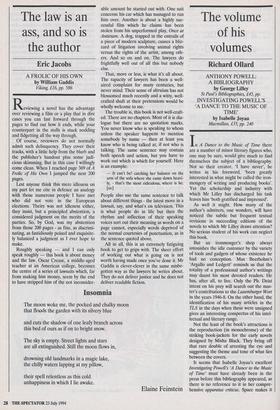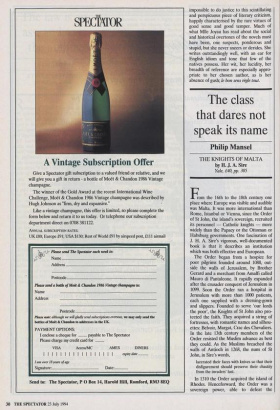The volume of his volumes
Richard 011ard
ANTHONY POWELL: A BIBLIOGRAPHY by George Lilley St Paul's Bibliographies, 145, pp.
INVESTIGATING POWELL'S 'A DANCE TO THE MUSIC OF TIME' by Isabelle Joyau Macmillan, £35, pp. 240 n A Dance to the Music of Time there are a number of minor literary figures who, one may be sure, would give much to find themselves the subject of a bibliography. Not so their creator. 'I have never', he writes in his foreword, 'been greatly interested in what might be called the iron- mongery of writing and producing books'. Yet the scholarship and industry with which Mr Lilley has discharged his task leaves him 'both gratified and impressed'.
As well it might. How many of the author's admirers, one wonders, will have noticed the subtle but frequent textual revisions in succeeding editions of the novels to which Mr Lilley draws attention? No serious student of his work can neglect this book.
But an ironmonger's shop always astonishes the idle customer by the variety of tools and gadgets of whose existence he had no conception. Max Beerbohm's 'Argallo and Ledgett' reminds us that the totality of a professional author's writings may daunt his most devoted readers. He has, after all, to live. Only the Ph. Deist intent on his prey will search out the mas- ter's contributions to the Luxembutger Wort in the years 1946-8. On the other hand, the identification of his many articles in the TLS in the days when these were unsigned gives an interesting conspectus of his intel- lectual and literary range.
Not the least of the book's attractions is the reproduction (in monochrome) of the striking book-jackets for the early novels designed by Misha Black. They bring off that rare double of arresting the eye and suggesting the theme and tone of what lies between the covers.
It seems that Isabelle Joyau's excellent Investigating Powell's 'A Dance to the Music of Time' must have already been in the press before this bibliography appeared, as there is no reference to it in her compre- hensive apparatus criticus. Space makes it impossible to do justice to this scintillating and perspicuous piece of literary criticism, happily characterised by the rare virtues of good sense and good temper. Much of what Mlle Joyau has read about the social and historical overtones of the novels must have been, one suspects, ponderous and stupid, but she never sneers or derides. She writes outstandingly well, with an ear for English idiom and tone that few of the natives possess. Her wit, her lucidity, her breadth of reference are especially appro- priate to her chosen author, as is her absence of gush; le bon sent regle tout.



















































 Previous page
Previous page